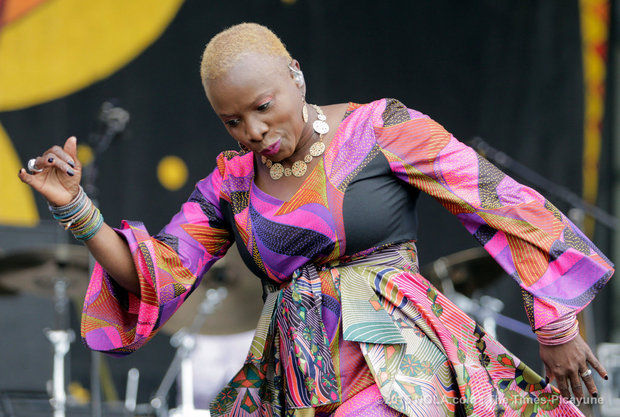Blog May 5, 2015
Field Report: Angelique Kidjo at New Orleans' Jazz and Heritage Festival
Midway through her electrifying, elevating set on the Congo Square Stage of the 2015 New Orleans Jazz and Heritage Festival, Angelique Kidjo introduced a song that she said was by the person who was her inspiration, whose very existence gave her the courage to become the artist she’s become—a singular figure of musical and cultural reach coming from her native Benin and now spanning the globe.
She was not going to tell us the name of the person, though, or of the song. If you didn’t already know that upon hearing it, “then you don’t live on this planet!”
Truth is, there were likely many in the crowd—a good number of them had set up at that stage area in anticipation of hip-hop/pop star Pitbull’s subsequent headlining set—who knew nothing of South African singer Miriam Makeba nor her groundbreaking international hit “Pata Pata.” Still, nearly everyone there was swept up by her unbridled energy, enthusiasm and pure joy in performing that effusive song. They danced with her, they sang with her, they smiled and laughed with her, and through Kidjo they now know Makeba’s spirit.
That’s what Kidjo does with, well, everything. She moves forward as if the world were how it ought to be, not how it is. And by her actions she helps make it so. And when she sees wrong in the world, she works hard, dedicatedly, to change it, with words, with action, and of course with music. It made for a clear highlight in days full of highlights in this seven-day festival-like-no-other—a day on which the Fairgrounds’ 10 stages hosted dozens of acts ranging from the astonishingly great teen ensemble of student "interns" from the famed Tipitina's club to the surprisingly engaged and powerful headlining set by the Who.
After she and her band opened with the voice-and-percussion chant “Ebile,” harking back to her childhood start with her mother’s traditional performance troupe in Cotonou, she introduced “Kulumbu,” from her recent world music Grammy Award-winning album Eve, with a powerfully concise condemnation of rape as the newest weapon of war and a call for women’s bodies and brains to be central to any peace process. The song itself is not dour, not condemning, but an exuberant celebration of women’s spirit, clear even to the vast majority of listeners who, presumably, do not understand a word of Yoruba. (Too bad New Orleans’ own Dr. John wasn’t on hand to add the piano solo he does on the album version.)
Later she cited statistics showing that health, economy and general welfare vastly improve throughout Africa when girls are given access to education—the issue at the heart of her own Batonga Foundation—sternly adding that it’s time for more young women to be given control of their own destinies rather than having little choice beyond young motherhood.
This all threaded through the interview she gave before an audience at the Allison Miner Music Heritage Stage inside the Fairgrounds’ grandstand on Sat., April 25, the previous day (with this writer honored beyond words to conduct the session). The lively chat, just hours after the city and festival were buffeted by a fierce storm, was filled with the same kind of anecdotes and sharp perceptions that fill her 2014 autobiography, Spirit Rising: My Life, My Music. She talked of her older brother turning her on to the music of Jimi Hendrix (the virtually bald boy donned an Afro wig to honor his new hero), but also of her parents, who sternly taught her not to accept that her skin color was a disadvantage or an excuse for anything. She was a tirelessly curious and questioning child, she said, always seeking answers to explain injustices and inequities. She still does.
Much of the discussion looked at the love she’s developed for New Orleans, expressed in her having recorded Sidney Bechet’s “Petit Fleur” twice—one being a gorgeous rendition on her new album, Sings, with the 110-piece Orchestre Philharmonique du Luxembourg—and having Dr. John play piano on her recording of “Kulumbu,” as well as through her long friendship with Branford Marsalis. We also discussed the cultural parallels of Cotonou and New Orleans, each port cities implanted with a vast variety of sounds, thoughts and peoples for a vibrant mix, but also sharing French colonial histories, though she bristled, rightfully, at my use of the term "legacies," the first word that unfortunately and inappropriately came to mind.
And though there were no plans for her to perform during the interview, as in some of the other JazzFest interviews, she surprised and delighted us by singing along, powerfully, playfully, when we played recordings from Sings and other albums to illustrate the discussion, superseding the recorded voice. Best karaoke ever!
As the stage show came to a climax the next day, Kidjo, escorted by a small cadre of NOLA police officers, sauntered out to the muddy field to dance with fans, lead a sing-along, coochy-coo a baby held by a young mom and shake some hands before returning to the stage, where for the next song she invited a few dozen to join her in a dance-off (comically shaking her head and rolling her eyes at a few who showed more enthusiasm than skills).
Never did the message overshadow the music, but nor was the music lacking a message, even if the message was simply to celebrate and dance and love.








